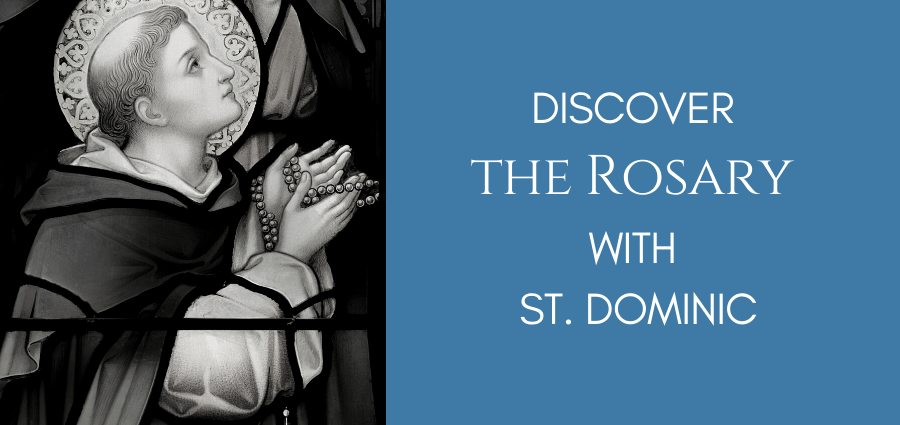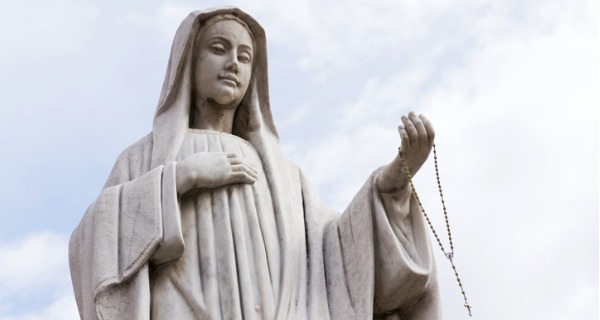
By: Nicole O'Leary on October 18th, 2020
That Christ Be Formed in You: The Rosary, Saint Dominic, and the Baptismal Call
In baptism, God invites us to a love which is so far beyond our natural strength that we must partake in God’s own life in order to practice it. What does this love, which is the essence of the baptismal vocation, look like?
Saint Paul explains to the Christians in Rome, “For those whom He foreknew He also predestined to be conformed to the image of His Son,” (Romans 8:29). Thus the aim of the Christian life is identification with Christ.
How quickly we brush this aside! Do we suspect that God would ask something of us without equipping us to respond? How nostalgically we speak of the lives of the saints! Do we believe that heroic holiness is a relic to be venerated rather than a program to be lived? How easily we look to false guarantors of freedom and happiness! Have we bought into the lie that political and economic structures can satisfy the desires of the human heart?
Have we Christians forgotten who we are and the nobility of our call? Have we forgotten that the life, death, and resurrection of Jesus Christ are not banal fables but God’s radical gesture by which He invites man to intimacy with his Creator? Have we forgotten that being a Christian means allowing ourselves to be cast into the mold of Christ—without the slightest violation of our individuality?
 Forgetfulness of the Christian identity is not a new phenomenon. Each century has witnessed the emergence (or resurgence) of various flavors of forgetfulness. One of these, a set of beliefs known collectively as Albigensianism, appeared in the twelfth and thirteenth centuries and posited that a dichotomy exists between matter and spirit; man is therefore a spiritual being imprisoned in an evil body. Tragically (but unsurprisingly), from these ideas flowed disrespect for marriage and esteem for suicide.
Forgetfulness of the Christian identity is not a new phenomenon. Each century has witnessed the emergence (or resurgence) of various flavors of forgetfulness. One of these, a set of beliefs known collectively as Albigensianism, appeared in the twelfth and thirteenth centuries and posited that a dichotomy exists between matter and spirit; man is therefore a spiritual being imprisoned in an evil body. Tragically (but unsurprisingly), from these ideas flowed disrespect for marriage and esteem for suicide.
The Albigensian mind had forgotten that God Himself ratified the goodness of the human body when He took flesh in the Person of Jesus Christ. Thus the antidote to Albigensianism was memory: memory of Christ, of God Incarnate, whose earthly life included a sweeping catalog of bodily experiences.
It was through a humble Spanish friar and a simple Marian prayer that God reawakened men’s memories. According to tradition, Saint Dominic de Guzmán received from our Blessed Mother the commission to preach “her Psalter”—that is, repeated recitation of the “Hail Mary” prayer in conjunction with recollection of the mysteries of Jesus’ life. This prayer eventually came to be called the Rosary.
The power of the Rosary to discredit erroneous beliefs and foster holiness lies in this distinctively Marian contemplation of Christ. As a young woman, Mary pondered in her heart the collective memory of her people; as a mother, she pondered the events of the life of her Son. In the prayer of the Rosary, we also recall these moments in Jesus’ life, and we do so with Mary, plunging our own hearts into hers.
Yet praying through the lens of Mary’s memories does more than supply us with material for meditation. Inviting Mary into our prayer can, in fact, be efficacious in accomplishing the identification with Christ of which St. Paul spoke in his letter to the Romans.
How is this possible? Saint Louis De Montfort, himself a Dominican Tertiary, insists that the presence of Mary in a soul is the necessary condition for that soul’s transformation into Christ. Just as the union of Mary and the Holy Spirit resulted in the Incarnation of the Word in Mary’s womb, so the union of Mary and the Holy Spirit in each individual soul produces Jesus Christ in that soul.
When we pray the Rosary, we enter into the Heart of the Mother which alone perfectly contemplates and loves the Son. Little by little, her thoughts become our thoughts; her way of remembering becomes ours. This is our invitation to Mary to enter into our own hearts and be united there with the Holy Spirit, her Spouse.
And gradually, ever-faithful to her unique call, Mary becomes the Mother of Christ in our souls.
This is our vocation, our identity. How lovingly we can hear Mary say to us—with greater eagerness even than St. Paul himself—these words from the Letter to the Galatians:
“My little children, with whom I am again in travail until Christ be formed in you!” (Galatians 4:19)
